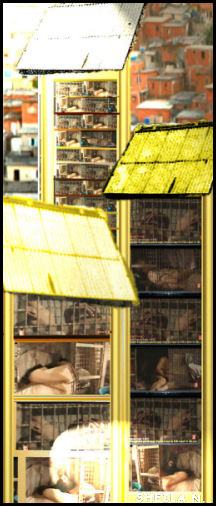Who shrank Australians' backyards?
 In a piece in The Australian[1] Dec 24, 2015, entitled "Honey, we shrank the backyard," population growth promoter for the property investment sector, Bernard Salt, observes that the block size of ordinary Australian houses has shrunk due to lifestyle changes such as after school organised sport and other after school activities and women working. The backyard, Salt acknowledges, was a “wondrous place” where children used to play in a relatively unstructured space, unobserved by parents, during an unsophisticated era devoid of today's patios and outdoor eating. The conclusion is that, after all, shrinking backyards come with bigger cities, and and a “leaner, cleaner more efficient way of living”.
In a piece in The Australian[1] Dec 24, 2015, entitled "Honey, we shrank the backyard," population growth promoter for the property investment sector, Bernard Salt, observes that the block size of ordinary Australian houses has shrunk due to lifestyle changes such as after school organised sport and other after school activities and women working. The backyard, Salt acknowledges, was a “wondrous place” where children used to play in a relatively unstructured space, unobserved by parents, during an unsophisticated era devoid of today's patios and outdoor eating. The conclusion is that, after all, shrinking backyards come with bigger cities, and and a “leaner, cleaner more efficient way of living”.

Why has Bernard Salt written this article?
One must bear in mind that it is the 1950s brick veneer villa that Bernard Salt targets. It appears to be his job to do this and to "evict" the ordinary Australians who live in these houses. He does not target houses such as the luxurious older style mansion where he lives in the comfortable suburb of Camberwell.
I heard him in person, as an invited speaker at a public meeting in Hawthorn about 4 years ago, derisively referring to widows in these houses "rattling around" and that they should move out, or words to this effect. This latest piece specifically refers to the back yards of brick veneer houses.
A.V. Jennings brick veneers with backyards
Many of the Post WW2 brick veneer houses in Melbourne were built by A.V.Jennings when there was an acute housing shortage. According to Jennings, one of the key design features of them was that children could be observed through the kitchen window playing in the backyard. I know this because a friend of mine was related to Jennings by marriage and she reports this is what he used to say about his creations. (This contrasts with Salt's memory or description of children being unobserved.)
The apparent purpose of the middle paragraphs of Salt's article are to paint an unattractive, unsophisticated rather bogan picture of what is being snatched from us, so that we won't want to try to hang on or to grieve too much. In this, Salt appears to draw heavily on Barry Humphries' work so - easy money for him.
Why do families now need two incomes and still can't afford housing?
Regarding Salt's pronouncement that "Mum's at work" and kids are in after-school activities, I would have thought the first would be the cause of the second. They are not independent of each other. Why is Mum at work? Or should I ask, "Why are both parents working and paying others to look after their children after school?" (After school care is not a free service.) Did people suddenly realise what great fun it was to be at work, so much fun that they would deny themselves the ONLY, chance that they would ever get in their lives to spend time with their offspring in the brief period called childhood? I somehow doubt it.
I would suggest that the design of low maintenance outdoor living areas probably reflects time poverty in households where both parents go to work. The trend to smaller blocks for people raising children is not a reflection of lifestyle choice but of economic imperative as housing prices and rents have risen. Both parents working instead of one amounts to a loss to the home of about 10 hours per day, 5 days per week. That is time lost to such activities as maintaining a garden.
Faux evolutionary approach to normalising land confiscation
Salt makes the loss of the backyard sound like an evolutionary process as we find more enticing pursuits outside the home but he doesn't say what those pursuits are. In rubbishing the old back yard, he singles out the incinerator. The incinerator has recently acquired very unattractive connotations both aesthetically and in terms of air pollution and carbon emissions. People are now very sensitive to these issues and Salt's reference to incinerators provides a great example of a way to turn everyone off the notion of ordinary Australians having a bit of land for themselves. I don't think incinerators then were universal, anyway and now we have paper and cardboard recycling. But is this a fair exchange for losing "the back yard" ? Should we be thus punished for past incinerator follies?
Society's gain is expressed as a "leaner, cleaner more efficient way of living." This is, however, unconvincing, as there is nothing in this description that alludes to quality of life or to any actual purpose for our lives, apart from "work".
Who might this article convince? People who have very limited time for reading, the actual victims who are fast losing space and amenity as the population soars and for whom a no regrets article like this might be somewhat comforting.
NOTES
[1] Note that Murdoch's Australian is one face of Murdoch's property dot com, www.realestate.com.au, so it is not surprising that Mr Salt writes for the Australian and for the Herald Sun.


Recent comments